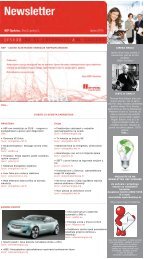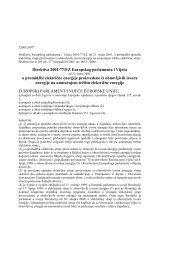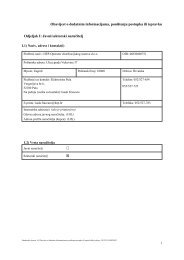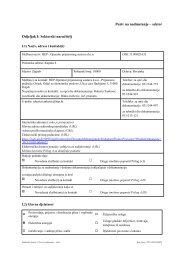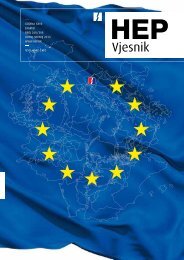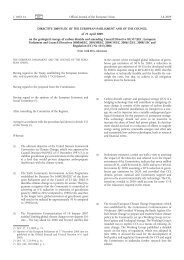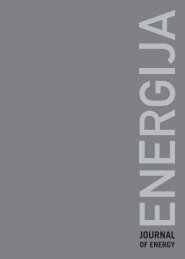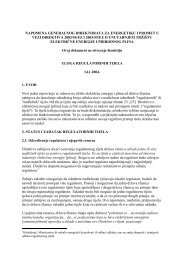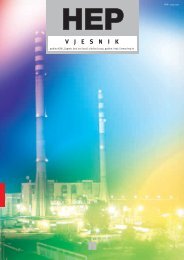koji se primjenjuju na davanje odobrenja i radsustava,∑ Uredba 1228/2003/EZ Europskog parlamentai VijeÊa o uvjetima pristupa mreæi za prekograniËnurazmjenu elektriËne energije, te∑ Uredba 1775/2005/EZ o uvjetima pristupatransportnim mreæama za prirodni plin.Unutar tog opÊeg zakonodavnog okvira regulatornomtijelu mogu se dodijeliti razliËite nadleænostii odgovornosti, odnosno poslovi. Na Okruglomstolu prezentacijama i raspravom primarno su bileobuhvaÊene nadleænosti i uloga regulatornog tijelau pogledu donoπenja metodologija tarifnih sustavai/ili odreappleivanja tarifa/naknada za energetske usluge,odnosno krajnje kupce. Neposredno u svezi stim prezentirani su i raspravljeni i moguÊi pristupireguliranju monopola ili javnih usluga (cijenakoriπtenja mreæe, uvjeta pristupa mreæama, pravilaza voappleenje sustava, uvjeta osiguranja stabilnostii pouzdanosti sustava, pravila i uvjeta osiguranjapomoÊnih usluga sustava). ©irom raspravom bilesu obuhvaÊene i ostale nadleænosti i poslovi kojise u pravilu dodjeljuju regulatornom tijelu, kao πtosu nadzor standarda kvalitete i izvedbe, kreiranjei provoappleenje opÊih uvjeta, propisa i standarda,reguliranje ulaska energetskih subjekata u sektor(dozvole, povlaπteni statusi, prikljuËenja, novaizgradnja) i nadzor nad træiπtem, izvjeπtavanje, savjetovanjevlade, ministarstava, javnosti, rjeπavanjeæalbi na rad operatora sustava i rjeπavanje æalbi isporova kupaca.Na Okruglom stolu jasno je pokazano da je unutartog jednog opÊeg zakonodavnog okvira svaka zemljaËlanica EU razvila i uspostavila vlastiti zakonodavnii regulatorni okvir za træiπte elektriËne energije i radnacionalnog regulatornog tijela, temeljeÊi rjeπenjai praksu na vaæeÊem osnovnom nacionalnompravnom i zakonodavnom sustavu. OpÊe je pravilo,a isto je viπe puta i u svim sluËajevima ponovljenona gotovo istovjetan naËin od strane predstavnikaregulatornih tijela Francuske, Austrije, Slovenije,Maapplearske i Hrvatske, sudionika Okruglog stola, daje cilj svake zemlje uspostaviti neovisno i efikasnonacionalno regulatorno tijelo koje Êe stvoritiuvjete i nadzirati razvoj i uspostavu razvidnog,efikasnog i nepristranog træiπta elektriËneenergije i plina na dobrobit svih sudionika tihtræiπta i krajnjih korisnika. Preduvjeti razvidnog,efikasnog i nepristranog træiπta elektriËne energijei plina su osiguranje i provedba razvidnogi nediskriminirajuÊeg pristupa energetskimmreæama po unaprijed poznatim, reguliranimuvjetima, neovisan i nepristran rad operatoraenergetskih sustava, razvidno i nepristranorjeπavanje sporova i prigovora na pristupe mreæamai rad operatora mreænih sustava, efikasna provedbai garancije raËunovodstvenog i upravljaËkognatural gas (LNG) and other types of gases thatcan technically and safely be injected into andtransported through the natural gas system, anddefines the rules on the organization and functionof the sector, market access, criteria andprocedures that are applicable to the granting ofauthorizations and the operation of the system,∑ Regulation 1228/2003/EC of the EuropeanParliament and of the Council on Conditions forAccess to the Network for Cross-Border Exchangesin Electricity, and∑ Regulation 1775/2005/EC of the European Parliamentand of the Council on Conditions for Accessto the Natural Gas Transmission Networks.Within this general legislative framework, variousauthorizations and responsibilities, i.e. tasks canbe assigned to a regulatory agency. At the RoundTable, the presentations and discussions were primarilyabout the authorities and roles of the regulatoryagency regarding the adoption of methodologies fortariff systems and/or determining tariffs/charges forenergy services, i.e. the final customers. In connectionwith this, potential approaches to the regulationof monopolies or public services were presentedand discussed (the cost of network use, conditionsfor network access, rules for system management,conditions for assuring the stability and reliabilityof a system, and rules and conditions for securingauxiliary system services). Broader discussions includedother authorities and tasks that as a rule areassigned to the regulatory body, such as the supervisionof the standards for quality and implementation,the creation and implementation of generalconditions, regulations and standards; regulation ofthe entry of energy entities into the sector (permits,privileged status, connections and new construction)and supervision over the market, reporting; advisingthe government, ministries and public; the settlingof complaints regarding the work of the system operator,and customer complaints and disputes.At the Round Table Discussion, it was clearly demonstratedthat within this general legislative framework,each Member Country of the EU has developed andestablished its own legislative and regulatory frameworkfor the electricity market and the work of thenational regulatory agency, based upon the solutionsand practice of the prevailing basic national legaland legislative system. As a general rule, which wasrepeated in all cases in a nearly identical manner inthe presentations by the representatives of the regulatoryagencies of France, Austria, Slovenia, Hungaryand Croatia, i.e. the Round Table participants, thegoal of every country is to establish an independentand efficient national regulatory agency that will createthe conditions, supervise the development andestablish transparent, efficient and nondiscriminatoryelectricity and gas markets for the benefit of all theKlepo, M., Uloga regulatornih tijela u donošenju ..., Energija, god. 56(2007), br. 5., str. 526-553Klepo, M., The Role of the Regulatory Agency in Adoption ..., Energija, vol. 56(2007), No. 5, pp. 526-553530
azdvajanja energetskih djelatnosti, sprjeËavanjemeappleusobnih subvencioniranja reguliranih inereguliranih djelatnosti unutar vertikalno ilihorizontalno integriranih sustava, efikasan sustavprekograniËnih razmjena, razvoj i uspostavaefikasnih træiπnih mehanizama i slobodna træiπnautakmica itd.S druge strane, Ëinjenice i pojavnost su da regulatornatijela u razliËitim zemljama imaju razliËitepozicije u odnosu na dræavna tijela i institucije,prvenstveno odgovarajuÊe vlade i ministarstva, terazliËite uloge i nadleænosti. U nekim zemljamaregulatorna tijela su organizacijska jedinica ilidio ministarstva ili pod nadzorom ministarstvaili vlade. U drugim zemljama su ili znaËajno iliu potpunosti neovisna tijela. U nekim zemljamaregulatorna tijela imaju nadleænost i obvezu nadzoraprovedbe podzakonskih akata, donoπenja metodologijatarifnih sustava, davanja odobrenja naplanove razvoja i planove investiranja reguliranihsubjekata, nadzora provedbe ili primjene tarifnihsustava i tarifa, nadzora financijskog poslovanja,nadzora provedbe raËunovodstvenog i upravljaËkograzdvajanja, nadzora kvalitete energetskih usluga,davanja odgovarajuÊih miπljenja i savjetovanjaministarstava i vlada o cijenama, tarifama, pitanjimauspostave energetskog træiπta i sl. U drugimzemljama nacionalna regulatorna tijela imajujaËu ulogu i nadleænosti, koje ukljuËuju donoπenjeodgovarajuÊih podzakonskih akata, ali i poduzimanjeodgovarajuÊih mjera, utvrappleivanje tarifai uvjeta pristupa mreæama, rjeπavanje sporova usvezi s pristupom mreæama i uvjetima koriπtenjamreæa, rjeπavanje prigovora i æalbi na rad operatoramreænih sustava, rjeπavanje prigovora i æalbikrajnjih kupaca i sliËno. Nisu zanemarivi i sustavimjera i sankcija koje nekim regulatornim tijelimastoje na raspolaganju da bi osnaæili svoje djelovanjei odluke.Kada su u pitanju nadleænosti za definiranje idonoπenje metodologija ekonomske regulacije,odnosno izbor, definiranje i donoπenje osnovnogregulacijskog pristupa, metodologije tarifnog sustavai samih tarifa, uloge regulatornih tijela se razlikuju.Opet, u nekim zemljama regulatorna tijelaimaju kljuËnu ulogu u svim segmentima procesaod definiranja metode regulacije i metodologijetarifnog sustava, nadzora poslovanja i revizije financijskihpokazatelja i izvjeπÊa energetskih subjekata,dubinske revizije i odobravanja troπkova,definiranja i odobravanja kljuËnih regulacijskih imakroekonomskih parametara, primjene mehanizamajavnog prezentiranja i oËitovanja javnosti,odnosno korisnika i kupaca o iznosima tarifnihstavki itd. U drugim zemljama regulatornim tijelimadane su u nadleænost i obveze samo nekaod navedenih prava, poslova i obveza. NajËeπÊiparticipants of these markets and the final customers.The prerequisites for transparent, efficient andnondiscriminatory electricity and gas markets are theassurance and implementation of transparent andnondiscriminatory access to the energy networks accordingto previously specified regulatory conditions,the independent and nondiscriminatory work of theenergy system operators, the transparent and nondiscriminatoryresolution of disputes and complaintsregarding network access and the work of the networksystem operators, the efficient implementationand guarantee of the accounting and managerial unbundlingof energy activities, the prevention of crosssubsidies among regulated and unregulated activitieswithin vertically or horizontally integrated systems,an effective system for cross-border exchanges, thedevelopment and establishment of efficient marketmechanisms and free market competition etc.Otherwise, the regulatory agencies in various countrieshave differing positions in relation to the stateagencies and institutions, primarily the correspondinggovernments and ministries, and various rolesand authorities. In some countries, the regulatoryagencies are organizational units, parts of a ministryor under the supervision of a ministry or the government.In other countries, they are either considerablyor entirely independent bodies. In some countries,the regulatory bodies have the authority andresponsibility of supervising the implementation ofbylaws, the adoption of the methodologies of the tariffsystems, granting approval for the developmentand investment plans of the regulated entities, supervisionover the implementation or application oftariff systems and tariffs, supervision over financialoperations, supervision over the implementation ofaccounting and managerial unbundling, supervisionover the quality of energy services, issuing suitableopinions and advising ministries and the governmentregarding prices, tariffs, questions regarding the establishmentof the energy market etc. In other countries,the national regulatory agency has a strong roleand powerful authority, including the adoption ofsuitable bylaws but also the undertaking of suitablemeasures for the determination of tariffs and conditionsfor network access, the settlement of disputesin connection with network access and conditions fornetwork use, the settlement of complaints regardingthe work of the network system operator, the settlementof complaints from the final customers etc. Thesystem of measures and penalties that some regulatoryagencies have at their disposal to enforce theiractivity and decisions is not insignificant.When authorities are in question for the definitionand adoption of methodologies for economic regulation,i.e. the selection, definition and adoption ofthe basic regulatory approach, methodologies of thetariff system and tariffs themselves, the roles of the531Klepo,M., Uloga regulatornih tijela u donošenju ..., Energija, god. 56(2007), br. 5., str. 526-553Klepo, M., The Role of the Regulatory Agency in Adoption ..., Energija, vol. 56(2007), No. 5, pp. 526-553
- Page 2 and 3:
05/07ENERGIJAIZDAVA»Hrvatska elekt
- Page 4 and 5:
UVODINTRODUCTIONDragi Ëitatelji,u
- Page 6:
ULOGA REGULATORNOG TIJELA UDONO©EN
- Page 9 and 10:
U radu Okruglog stola po pozivu su
- Page 11 and 12:
azdvajanja energetskih djelatnosti,
- Page 13 and 14:
3 RESTRUKTURIRANJEELEKTROENERGETSKO
- Page 15 and 16:
nizma, ukljuËujuÊi i sadræaje i
- Page 17 and 18:
Tarifni sustav /Tariff systemSlika
- Page 19 and 20:
Stopa povrata koja omoguÊuje nakna
- Page 21 and 22:
Troškovi poslovanja /Operational c
- Page 23 and 24:
znati polugodiπnji ukupni troπkov
- Page 25 and 26:
dræava i njihovih odgovarajuÊih e
- Page 27 and 28:
ili naroËito u sluËajevima kada s
- Page 29 and 30:
metode regulacije i metodologije ta
- Page 31 and 32:
Na spomenuti kontekst ulaganja u od
- Page 33 and 34:
greater cooperation and the transfe
- Page 37 and 38:
Hrvatska je na poËetku uvoappleenj
- Page 39:
∑ treba li regulatorno tijelo bit
- Page 42 and 43:
izraappleuje temeljem Strategije en
- Page 44 and 45:
P max (t - 1) ∑ gornja granica do
- Page 46 and 47:
azina investicija ukljuËiti u regu
- Page 48 and 49:
je porast potroπnje te zamjena pos
- Page 50 and 51:
Tablica 3 ∑ Pojednostavljen primj
- Page 52:
eguliranih cijena. Stabilna razina
- Page 55 and 56:
4.2.1 Iskustva VijeÊa za regulacij
- Page 57 and 58:
4.2.2 Iskustva Hrvatske energetske
- Page 59 and 60:
zakonskih akata, provede sve nuæne
- Page 61 and 62:
latornog tijela tijekom procesa utv
- Page 63 and 64:
LITERATURA / REFERENCES[1] Zakon o
- Page 66 and 67:
1 UVODU niskofrekvencijske prijelaz
- Page 68 and 69:
Slika 1Krivulja magnetiziranjatrans
- Page 70 and 71:
2 MATEMATI»KI MODELPRI UKLAPANJUNE
- Page 72 and 73:
Slika 5Uklapanjetransformatora ∑p
- Page 74 and 75:
Kada se odrede konstante a, b i c t
- Page 76 and 77:
4 NUMERI»KI PRISTUPSada Êe se ana
- Page 78 and 79:
Tada je opÊe rjeπenje jednadæbe
- Page 80 and 81:
gdje su:where:(31a)(31b)Implicitno
- Page 82 and 83:
5 TEST PRIMJERProgrami dobiveni pre
- Page 84 and 85:
(36)(37)gdje su:j = 1, 2, 3 oznake
- Page 86 and 87:
7 ZAKLJU»AKU radu je opisan model
- Page 88:
DIJAGNOSTI»KI PREGLEDRASPADA ELEKT
- Page 91 and 92:
Slika 1Jednopolna shemasustava na p
- Page 93 and 94:
2.7951.3980-1.398-2.7952.7951.3980S
- Page 95 and 96:
Slika 7Oscilogram 5 ∑ Naponna sab
- Page 97 and 98:
LITERATURA / REFERENCES[1] Internal
- Page 100 and 101:
1 UVODSustavi relejne zaπtite u el
- Page 102 and 103:
∑ Ëesti problem sliËnih baza po
- Page 104 and 105:
slike (npr. jednopolne sheme), dija
- Page 106 and 107:
Pojedinim korisnicima u ovoj grupi
- Page 108 and 109:
· opis svih relacija u bazi podata
- Page 110 and 111:
Slika 4IzvjeπÊe o udeπenjuzaπti
- Page 112 and 113:
7 ZAKLJU»AKRazvoj i odræavanje in
- Page 114 and 115:
UPUTSTVO ZA RUKOPISUPUTEAUTORIMA1.
- Page 117:
DIJAGNOSTI»KI PREGLEDRASPADA ELEKT
- Page 120 and 121:
Slika 1Jednopolna shemasustava na p
- Page 122 and 123:
2.7951.3980-1.398-2.7952.7951.3980S
- Page 124 and 125:
Slika 7Oscilogram 5 ∑ Naponna sab
- Page 126 and 127:
LITERATURA / REFERENCES[1] Internal
- Page 129 and 130:
1 UVODU niskofrekvencijske prijelaz
- Page 131 and 132:
Slika 1Krivulja magnetiziranjatrans
- Page 133 and 134:
2 MATEMATI»KI MODELPRI UKLAPANJUNE
- Page 135 and 136:
Slika 5Uklapanjetransformatora ∑p
- Page 137 and 138:
Kada se odrede konstante a, b i c t
- Page 139 and 140:
4 NUMERI»KI PRISTUPSada Êe se ana
- Page 141 and 142:
Tada je opÊe rjeπenje jednadæbe
- Page 143 and 144:
gdje su:where:(31a)(31b)Implicitno
- Page 145 and 146:
5 TEST PRIMJERProgrami dobiveni pre
- Page 147 and 148:
(36)(37)gdje su:j = 1, 2, 3 oznake
- Page 149 and 150:
7 ZAKLJU»AKU radu je opisan model
- Page 151:
REGULATORNA POLITIKA I NJENUTJECAJ
- Page 154 and 155:
Hrvatska je na poËetku uvoappleenj
- Page 156 and 157:
∑ treba li regulatorno tijelo bit
- Page 158 and 159:
U Bugarskoj se financijski nadzor p
- Page 160 and 161:
ZakljuËak koji se moæe izvuÊi iz
- Page 162 and 163:
no tijelo na osnovi troπka kapital
- Page 164 and 165:
Tablica 1 ∑ Pojednostavljen primj
- Page 166 and 167:
nih razdoblja. Ukoliko je energetsk
- Page 168 and 169: Problem koji se javlja u regulatorn
- Page 170 and 171: Naime, bitno je napomenuti da je HE
- Page 172 and 173: 4.2.1 Iskustva VijeÊa za regulacij
- Page 174 and 175: 4.2.2 Iskustva Hrvatske energetske
- Page 176 and 177: zakonskih akata, provede sve nuæne
- Page 178 and 179: latornog tijela tijekom procesa utv
- Page 180 and 181: LITERATURA / REFERENCES[1] Zakon o
- Page 183 and 184: 1 UVODNa inicijativu SO C5 ∑ Træ
- Page 185 and 186: koji se primjenjuju na davanje odob
- Page 187 and 188: je sluËaj da regulatorno tijelo im
- Page 189 and 190: integralnog tarifnog sustava koji j
- Page 191 and 192: Slika 1Restrukturiranjeelektroenerg
- Page 193 and 194: zatim s vremenom, kako su svi sudio
- Page 195 and 196: Slika 5Tarifni sustav zaprijenos el
- Page 197 and 198: knjigovodstvenog praÊenja po izdvo
- Page 199 and 200: ma, kod svih regulatornih tijela i
- Page 201 and 202: 7) Regulatorna tijela imaju vaænu
- Page 203 and 204: træiπta, odnosno razvoja i uspost
- Page 205 and 206: tuacijama regulatorna tijela postup
- Page 207 and 208: 5 ZAKLJU»AKOkrugli stol o ulozi re
- Page 210 and 211: 05/07ENERGIJAIZDAVA»Hrvatska elekt
- Page 212 and 213: UVODINTRODUCTIONDragi Ëitatelji,u
- Page 214: ULOGA REGULATORNOG TIJELA UDONO©EN
- Page 217: U radu Okruglog stola po pozivu su
- Page 221 and 222: 3 RESTRUKTURIRANJEELEKTROENERGETSKO
- Page 223 and 224: nizma, ukljuËujuÊi i sadræaje i
- Page 225 and 226: Tarifni sustav /Tariff systemSlika
- Page 227 and 228: Stopa povrata koja omoguÊuje nakna
- Page 229 and 230: Troškovi poslovanja /Operational c
- Page 231 and 232: znati polugodiπnji ukupni troπkov
- Page 233 and 234: dræava i njihovih odgovarajuÊih e
- Page 235 and 236: ili naroËito u sluËajevima kada s
- Page 237 and 238: metode regulacije i metodologije ta
- Page 239 and 240: Na spomenuti kontekst ulaganja u od
- Page 241 and 242: greater cooperation and the transfe
- Page 244 and 245: 1 UVODU prosincu 2006. godine Hrvat
- Page 246 and 247: poveÊanje uËinkovitosti, odnosno
- Page 248 and 249: Pitanja koja su zanimljiva za ulogu
- Page 250 and 251: izraappleuje temeljem Strategije en
- Page 252 and 253: P max (t - 1) ∑ gornja granica do
- Page 254 and 255: azina investicija ukljuËiti u regu
- Page 256 and 257: je porast potroπnje te zamjena pos
- Page 258 and 259: Tablica 3 ∑ Pojednostavljen primj
- Page 260 and 261: eguliranih cijena. Stabilna razina
- Page 262 and 263: 4.2 Kriteriji za davanje suglasnost
- Page 264 and 265: πto je u skladu s prijedlogom Mre
- Page 266 and 267: Jedan od bitnih preduvjeta za mogu
- Page 268 and 269:
5 ZAKLJU»AKU utvrappleivanju regul
- Page 270 and 271:
prihvaÊene metode priznatih troπk
- Page 272:
NUMERI»KI PRORA»UNNISKOFREKVENCIJ
- Page 275 and 276:
Kao πto je veÊ spomenuto, osnovna
- Page 277 and 278:
Slika 2Nesinusoidalnastruja magneti
- Page 279 and 280:
jezgre transformatora L m , inaËe
- Page 281 and 282:
(9)(10)(11)Napon U 0 i struja I C0
- Page 283 and 284:
Pojednostavljeni algoritam raËunan
- Page 285 and 286:
gdje su konstante a i, i = 0, 1, 2,
- Page 287 and 288:
dobiva se jednadæba u prostoru sta
- Page 289 and 290:
PoËetakUËitavanjeparametara susta
- Page 291 and 292:
Struja transformatora / Transformer
- Page 293 and 294:
(38)Rezultati mjerenja i simulacija
- Page 295 and 296:
LITERATURA / REFERENCES[1] CIPCIGAN
- Page 298 and 299:
1 UVODIzolirani otoËni elektroener
- Page 300 and 301:
2 ANALIZA INCIDENTAKako sustavu SCA
- Page 302 and 303:
Slika 4Oscilogram 2 ∑Struje zabil
- Page 304 and 305:
3 ZAKLJU»CIElektroenergetski susta
- Page 306:
BAZA PODATAKARELEJNE ZA©TITERELAY
- Page 309 and 310:
zaπtite povremeno mijenjaju noviji
- Page 311 and 312:
ogatim, prirodnim i korisniku blisk
- Page 313 and 314:
Slika 1Dio relacijske shemebaze pod
- Page 315 and 316:
je omoguÊiti korisniku πto lakπe
- Page 317 and 318:
Slika 2Sloæena ekranska formaFigur
- Page 319 and 320:
6 TESTIRANJE BAZEPODATAKA I OBUKAKO
- Page 321 and 322:
LITERATURA / REFERENCES[1] MCCLAIN,
- Page 323:
MANUSCRIPTS1. Energija journal publ




